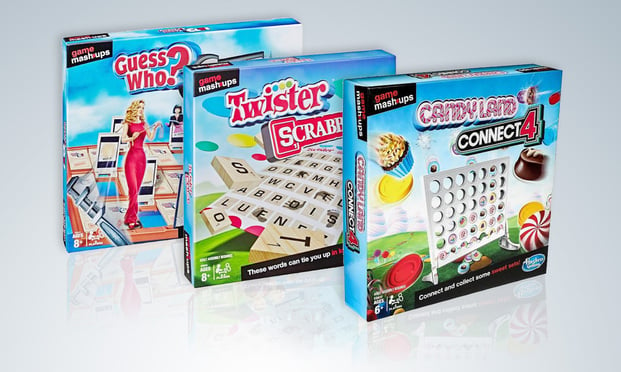Film Industry Vet and Inventor Claims Hasbro Stole 'Mash-Ups' Games Idea
The plaintiff, David Wexler, claims from 2007 to 2015 he sat down at least 10 times with Hasbro's product development team and pitched the idea for a new line of "Mash-Up" toys and games that Hasbro is now using without paying him.
February 25, 2020 at 06:30 PM
5 minute read
 Hasbro's Mashups games. Graphics: Rafal Pytel
Hasbro's Mashups games. Graphics: Rafal Pytel
A film director and the son of a prolific, longstanding game inventor for Hasbro is suing the toy giant, saying that it is reaping millions of dollars in revenues after stealing his idea for a line of Hasbro game and toy combinations called "Mash-Ups."
David Wexler, a film director, screenwriter and producer who has helped to create at least six feature films, has filed a 21-page misappropriation and breach of contract lawsuit against Hasbro in the U.S. District Court for the Southern District of New York.
Wexler claims that from 2007 to 2015 he sat down at least 10 times with Hasbro's product development team—sometimes accompanied by his father, Howard Wexler, the creator of Hasbro's famed Connect 4 game—and pitched different toy ideas, including the idea for a new line of "Mash-Up" games and toys that "would combine the trademarks, gameplay, style and artwork of two classic Hasbro games and toys into a single game or toy; thus creating a new game experience that would be both familiar and novel to players," according to his lawsuit.
But eventually, by 2015, Hasbro told him that it would not be using his ideas and concepts, he claims. Then, around 2016, Hasbro began developing a line of combining, or "mashing up," classic Hasbro games, some of which it would bring to market a few years later, the lawsuit states.
According to both Wexler's complaint and his lawyer, Philippe Zimmerman, a Moses & Singer partner in Manhattan, Wexler had pitched using specific Hasbro combinations such as Yahtzee and Boggle, Monopoly and Trouble, Jenga and Twister, Transformers and Sorry, and Connect 4 and Nerf.
Then in 2019, Hasbro, which some consider to be the largest toy maker in the world—citing its stock market value—started putting out mash-up-type games including a combination of Jenga and Monopoly that Wexler considers to be very similar to his Jenga and Twister idea, according to his complaint. Both his proposed idea and the Jenga/Monopoly "game mash+up" use the Jenga tiles and have the other games' design elements printed on the tiles.
Moreover, Hasbro has released and is making large revenues from a combination of Connect 4 and Nerf that mimics his Connect 4 and Nerf proposal, although the gaming behemoth has not included that combination game in its game mash+up line, according to Wexler's suit.
"In a blatant, albeit doomed, effort to hide its deceit in stealing Mr. Wexler's idea of a collection of Mash-Ups, Hasbro manufactured and sold the Connect 4 and Nerf Mash-Up, but did not include it in its mash+ups collection," says Wexler's lawsuit, which was filed earlier this month.
Hasbro did not respond to a request for comment.
The complaint, while not naming a specific damages amount, demands that continuing royalty fees be paid to Wexler into the future—or in perpetuity, as Zimmerman puts it. The complaint also requests punitive damages.
The suit also makes clear that Wexler believes Hasbro has been making millions of dollars in profits from numerous mash-up-type games, and that its profits will likely grow for years to come.
"Hasbro's game mash+ups have been a commercial success," the complaint says. "After being initially offered exclusively at Target in 2019, game mash+ups are now widely available, including at Walmart and on Amazon."
It adds, "Indeed, upon information and belief, game mash+ups are generating millions of dollars in revenues for Hasbro and are expected to [generate] substantially more in revenues as a result of, among other things, their broader availability and the addition of more games to the game mash+ups collection."
The industry standard for a game or toy investor's royalties is 5%, according to the suit.
It also alleges that if Wexler is not ultimately paid the royalties he deserves, the "trust" long relied on between toy and game inventors and toy companies could be broken.
"Hasbro's conduct in stealing Mr. Wexler's ideas violates a core element of the toy and game inventing industry's custom and practice, and if left to stand, could destroy the trust between toy and game inventors and toy and game companies that has played a critical role in sustaining the toy industry for decades," the suit says.
Howard Wexler has allegedly invented more than 120 game and toy concepts for Hasbro and other companies over many decades, Zimmerman, who specializes in part in intellectual property cases, said by phone Tuesday.
He added that "there is a line of [legal] authority that has developed in New York, California and other jurisdictions that recognize that creative people should be compensated for their work and their ideas. This case presents another example of a creative person needing to go to court to protect their rights."
Zimmerman also said that "Howard [Wexler] is very supportive of his son, and my understanding is he believes his son presented Hasbro with a valuable idea that they are now exploiting without paying him."
"David hopes and expects that his suit with Hasbro will not have any affect on his father's decades-long relationship with Hasbro," the lawyer added.
This content has been archived. It is available through our partners, LexisNexis® and Bloomberg Law.
To view this content, please continue to their sites.
Not a Lexis Subscriber?
Subscribe Now
Not a Bloomberg Law Subscriber?
Subscribe Now
NOT FOR REPRINT
© 2025 ALM Global, LLC, All Rights Reserved. Request academic re-use from www.copyright.com. All other uses, submit a request to [email protected]. For more information visit Asset & Logo Licensing.
You Might Like
View All

'Serious Legal Errors'?: Rival League May Appeal Following Dismissal of Soccer Antitrust Case
6 minute read
'It's a Matter of Life and Death:' Ailing Harvey Weinstein Urges Judge to Move Up Retrial

Spotify GC Steps Down, Opts to 'Step Away From Full-Time Corporate Life'
2 minute readTrending Stories
- 1How I Made Office Managing Partner: 'Always Be Willing to Work Harder Than the Person Next to You,' Says Esther Cho of Stradley Ronon
- 2People in the News—Feb. 10, 2025—Flaster Greenberg, Tucker Arensberg
- 3The Support Center for Child Advocates Welcomes New Executive Director
- 4'Shame on Us': Lawyer Hits Hard After Judge's Suicide
- 5Upholding the Integrity of the Rule of Law Amid Trump 2.0
Who Got The Work
J. Brugh Lower of Gibbons has entered an appearance for industrial equipment supplier Devco Corporation in a pending trademark infringement lawsuit. The suit, accusing the defendant of selling knock-off Graco products, was filed Dec. 18 in New Jersey District Court by Rivkin Radler on behalf of Graco Inc. and Graco Minnesota. The case, assigned to U.S. District Judge Zahid N. Quraishi, is 3:24-cv-11294, Graco Inc. et al v. Devco Corporation.
Who Got The Work
Rebecca Maller-Stein and Kent A. Yalowitz of Arnold & Porter Kaye Scholer have entered their appearances for Hanaco Venture Capital and its executives, Lior Prosor and David Frankel, in a pending securities lawsuit. The action, filed on Dec. 24 in New York Southern District Court by Zell, Aron & Co. on behalf of Goldeneye Advisors, accuses the defendants of negligently and fraudulently managing the plaintiff's $1 million investment. The case, assigned to U.S. District Judge Vernon S. Broderick, is 1:24-cv-09918, Goldeneye Advisors, LLC v. Hanaco Venture Capital, Ltd. et al.
Who Got The Work
Attorneys from A&O Shearman has stepped in as defense counsel for Toronto-Dominion Bank and other defendants in a pending securities class action. The suit, filed Dec. 11 in New York Southern District Court by Bleichmar Fonti & Auld, accuses the defendants of concealing the bank's 'pervasive' deficiencies in regards to its compliance with the Bank Secrecy Act and the quality of its anti-money laundering controls. The case, assigned to U.S. District Judge Arun Subramanian, is 1:24-cv-09445, Gonzalez v. The Toronto-Dominion Bank et al.
Who Got The Work
Crown Castle International, a Pennsylvania company providing shared communications infrastructure, has turned to Luke D. Wolf of Gordon Rees Scully Mansukhani to fend off a pending breach-of-contract lawsuit. The court action, filed Nov. 25 in Michigan Eastern District Court by Hooper Hathaway PC on behalf of The Town Residences LLC, accuses Crown Castle of failing to transfer approximately $30,000 in utility payments from T-Mobile in breach of a roof-top lease and assignment agreement. The case, assigned to U.S. District Judge Susan K. Declercq, is 2:24-cv-13131, The Town Residences LLC v. T-Mobile US, Inc. et al.
Who Got The Work
Wilfred P. Coronato and Daniel M. Schwartz of McCarter & English have stepped in as defense counsel to Electrolux Home Products Inc. in a pending product liability lawsuit. The court action, filed Nov. 26 in New York Eastern District Court by Poulos Lopiccolo PC and Nagel Rice LLP on behalf of David Stern, alleges that the defendant's refrigerators’ drawers and shelving repeatedly break and fall apart within months after purchase. The case, assigned to U.S. District Judge Joan M. Azrack, is 2:24-cv-08204, Stern v. Electrolux Home Products, Inc.
Featured Firms
Law Offices of Gary Martin Hays & Associates, P.C.
(470) 294-1674
Law Offices of Mark E. Salomone
(857) 444-6468
Smith & Hassler
(713) 739-1250






